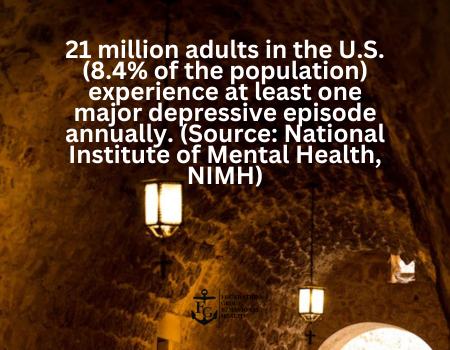Depressive mood disorders affect millions of people worldwide, cutting across age groups, genders, and cultural boundaries. These disorders go far beyond the occasional feelings of sadness or disappointment that everyone experiences. They involve persistent and severe emotional, cognitive, and physical symptoms that interfere with daily life, relationships, and personal well-being.
At Foundations Group Behavioral Health, we provide a range of evidence-based treatments for depressive mood disorders, including Psychiatric Day Treatment, Half-Day Treatment Programs, and Outpatient Mental Health Programs. Our mission is to empower individuals to regain control over their lives and achieve lasting recovery.
What Are Depressive Mood Disorders?
Depressive mood disorders, also known as depressive disorders, are mental health conditions characterized by prolonged periods of sadness, loss of interest, or pleasure in activities, and significant disruptions in daily functioning. These conditions can affect an individual’s thoughts, feelings, behaviors, and physical health.
Key Symptoms of Depressive Mood Disorders
- Persistent sadness, emptiness, or hopelessness.
- Loss of interest or pleasure in previously enjoyed activities.
- Changes in appetite or weight (either increase or decrease).
- Sleep disturbances (insomnia or hypersomnia).
- Fatigue or loss of energy.
- Difficulty concentrating, thinking, or making decisions.
- Feelings of worthlessness or excessive guilt.
- Recurrent thoughts of death, self-harm, or suicide.
It’s essential to note that these symptoms vary in intensity and duration depending on the type of depressive mood disorder a person is experiencing.
Common Types of Depressive Mood Disorders
There are several types of depressive mood disorders, each with distinct features. Understanding these types is crucial for identifying the appropriate treatment plan.
1. Major Depressive Disorder (MDD)
MDD is one of the most severe and prevalent forms of depression, affecting over 21 million adults annually in the United States.
- Symptoms: Intense sadness, feelings of worthlessness, fatigue, loss of interest, and suicidal ideation lasting at least two weeks.
- Treatment Options: A combination of medication, psychotherapy, and structured programs like Depressive Disorder Treatment Programs or Psychiatric Day Treatment.
2. Persistent Depressive Disorder (PDD)
Also known as dysthymia, PDD is a chronic form of depression lasting two years or more.
- Symptoms: Low self-esteem, fatigue, and difficulty maintaining motivation, often with milder but longer-lasting symptoms than MDD.
- Treatment Options: Long-term therapy, lifestyle adjustments, and participation in programs like Half-Day Treatment Programs or Outpatient Mental Health Programs.
3. Seasonal Affective Disorder (SAD)
SAD is a type of depression related to seasonal changes, typically occurring in the fall and winter months.
- Symptoms: Low energy, oversleeping, weight gain, and carbohydrate cravings.
- Treatment Options: Light therapy, psychotherapy, and participation in structured care to manage symptoms.
4. Bipolar Disorder (Depressive Episodes)
Bipolar disorder includes alternating periods of mania and depression. The depressive episodes share many characteristics with MDD.
- Symptoms: Intense sadness, lack of energy, difficulty concentrating, and suicidal thoughts during depressive phases.
- Treatment Options: Mood stabilizers, therapy, and specialized Co-Occurring Disorder Treatment Programs for individuals with overlapping conditions.
5. Postpartum Depression
Postpartum depression occurs after childbirth and is linked to hormonal changes, sleep deprivation, and emotional adjustments.
- Symptoms: Severe sadness, anxiety, fatigue, and difficulty bonding with the baby.
- Treatment Options: Therapy, medication, and support tailored to the needs of new parents.
6. Premenstrual Dysphoric Disorder (PMDD)
PMDD is a severe form of premenstrual syndrome (PMS) that impacts emotional and physical health.
- Symptoms: Mood swings, irritability, depression, and physical symptoms like bloating and fatigue.
- Treatment Options: Hormonal therapy, antidepressants, and behavioral therapy.
7. Atypical Depression
Atypical depression includes symptoms such as increased appetite, hypersomnia, sensitivity to rejection, and a heavy feeling in the limbs.
- Treatment Options: Antidepressants and therapies offered in Outpatient Mental Health Programs or Psychiatric Day Treatment.
Impact of Depressive Mood Disorders
Depressive mood disorders can profoundly impact every aspect of a person’s life, from personal relationships to physical health. Without treatment, these disorders can lead to:
- Chronic Health Conditions: Increased risk of heart disease, diabetes, and chronic pain.
- Workplace Challenges: Difficulty maintaining focus, reduced productivity, and absenteeism.
- Relationship Strain: Emotional withdrawal, irritability, and difficulty communicating with loved ones.
- Substance Use Disorders: Increased likelihood of turning to alcohol or drugs to cope.
Programs like Co-Occurring Disorder Treatment Programs address the intersection of depression and substance use, providing integrated care for both issues.
How Is Depression Treated?
Effective treatment for depressive mood disorders requires a combination of therapies tailored to each individual’s needs.
1. Psychotherapy
- Cognitive Behavioral Therapy (CBT): Focuses on identifying and changing negative thought patterns and behaviors.
- Dialectical Behavior Therapy (DBT): Teaches skills for emotional regulation and interpersonal effectiveness.
- Interpersonal Therapy (IPT): Addresses relationship issues contributing to depression.
2. Medication
- Antidepressants: SSRIs, SNRIs, and other medications can help balance brain chemicals and improve mood.
- Mood Stabilizers: Used for individuals with bipolar disorder to manage depressive and manic episodes.
3. Lifestyle Changes
- Regular exercise, a balanced diet, and sufficient sleep play a significant role in managing depressive symptoms.
- Mindfulness practices, such as meditation and yoga, can reduce stress and promote emotional well-being.
4. Structured Treatment Programs
At Foundations Group Behavioral Health, we offer specialized programs to address depressive mood disorders effectively:
- Psychiatric Day Treatment: Provides intensive care for individuals with severe symptoms who need a structured environment but don’t require hospitalization.
- Half-Day Treatment Programs: Flexible support for those balancing treatment with personal responsibilities.
- Outpatient Mental Health Programs: Designed for individuals with mild to moderate symptoms, allowing them to continue daily activities while receiving therapy.
- Depressive Disorder Treatment Program: Tailored for individuals experiencing significant depressive symptoms, focusing on emotional regulation, coping strategies, and resilience.

The Importance of Early Intervention
Early diagnosis and treatment significantly improve outcomes for individuals with depressive mood disorders. Delaying care can lead to worsening symptoms and more significant disruptions in life. Programs like Outpatient Mental Health Programs and Half-Day Treatment Programs provide accessible entry points for individuals seeking help.
Breaking the Stigma of Depression
Stigma often prevents people from seeking help for depressive mood disorders. At Foundations Group Behavioral Health, we strive to create a supportive and judgment-free environment where individuals feel empowered to prioritize their mental health.
Ways to Combat Stigma
- Education: Understanding the reality of depressive disorders reduces fear and misconceptions.
- Open Conversations: Sharing personal experiences fosters a culture of acceptance.
- Advocacy: Supporting mental health initiatives and policies promotes accessibility and awareness.
How Foundations Group Behavioral Health Can Help
Located in Massachusetts, Foundations Group Behavioral Health offers compassionate, evidence-based care for individuals struggling with depressive mood disorders.
Our Approach:
- Individualized Care: Tailored treatment plans to meet each person’s unique needs.
- Comprehensive Services: Programs that address mental health, co-occurring disorders, and emotional well-being.
- Experienced Team: Clinicians and therapists specializing in treating depressive mood disorders.
Final Thought
If you or a loved one is struggling with a depressive mood disorder, you don’t have to face it alone. At Foundations Group Behavioral Health, we are here to support you with comprehensive programs like Psychiatric Day Treatment, Half-Day Treatment Programs, and Outpatient Mental Health Programs designed to foster lasting recovery.
Contact us today at 888.685.9730 to learn more about our services and take the first step toward healing. Together, we can help you reclaim your life and build a brighter, healthier future.
FAQ on Depressive Mood Disorders
What are depressive mood disorders?
Depressive mood disorders are mental health conditions characterized by persistent sadness, loss of interest, and difficulty functioning in daily life. They include conditions like major depressive disorder, persistent depressive disorder, and seasonal affective disorder.
What are the common symptoms of depressive mood disorders?
Symptoms include persistent sadness, fatigue, changes in appetite or sleep patterns, difficulty concentrating, feelings of worthlessness, and thoughts of self-harm or suicide.
What are the different types of depressive mood disorders?
Common types include Major Depressive Disorder (MDD), Persistent Depressive Disorder (PDD), Seasonal Affective Disorder (SAD), Bipolar Disorder (depressive episodes), Postpartum Depression, Premenstrual Dysphoric Disorder (PMDD), and Atypical Depression.
How are depressive mood disorders treated?
Treatment often includes a combination of psychotherapy (such as Cognitive Behavioral Therapy), medication (antidepressants or mood stabilizers), lifestyle changes, and structured programs like Psychiatric Day Treatment or Outpatient Mental Health Programs.
When should someone seek help for depression?
If symptoms persist for more than two weeks, interfere with daily life, or include thoughts of self-harm, it’s essential to seek professional help immediately.
What programs are available for treating depression?
Programs such as Psychiatric Day Treatment, Half-Day Treatment Programs, Outpatient Mental Health Programs, and Depressive Disorder Treatment Programs provide comprehensive care tailored to individual needs.
Can depression occur alongside other conditions?
Yes, many people with depression also experience co-occurring conditions such as anxiety or substance use disorders. Integrated care through a Co-Occurring Disorder Treatment Program can address these overlapping challenges.








